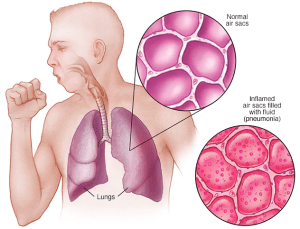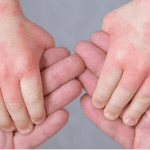Pneumonia is an inflammation of the lungs. This disease of the lungs does not go away overnight. It can take a week to a month to recover from this condition. As you may already know, Covid-19 or new coronavirus infections also develop a form of pneumonia.

Depending on the type of pneumonia, the doctor may prescribe medication to fight the bacteria or virus. It may be possible to recover from this illness by taking some home remedies.
By observing some symptoms of pneumonia, you can identify that you have pneumonia or not. The symptoms of pneumonia can range from mild to severe hospitalization. How a person’s body responds to pneumonia depends on the nature of the bacterium that caused the infection, the person’s age, and overall health.
What is Pneumonia?
Pneumonia is an inflammatory disease of the lungs that can be caused by a virus, bacterial, or fungal infection. Pneumonia usually affects older people, who have a weakened immune system, or who have had a chronic illness. Children, young people, and healthy people can also get pneumonia. It is possible to prevent pneumonia-related deaths by raising awareness.
Also Read – Dengue Fever: Sign & Symptoms, Prevention and Treatment of Dengue Fever
Premature birth, low birth weight, malnutrition, an unhealthy environment, not getting vaccinated on time, or any other physical illness can easily lead to pneumonia.
Pneumonia is divided into several categories based on the cause. Such as pneumonia from contact, pneumonia from the hospital, aspiration pneumonia, pneumonia caused by opportunistic germs, and pneumonia caused by other germs.
What Causes Pneumonia?
This disease causes inflammation in the lungs. Water can also accumulate in many areas. Pneumonia is usually caused by a bacterial or viral infection. For example, a bacterial infection called Streptococcus pneumoniae is one of the leading causes of pneumonia. In addition, fungal infections can often cause pneumonia.
How Pneumonia Spread?
- Pneumonia is a highly contagious disease. The germs of this disease are spread in the air through sneezing or coughing of the infected person.
- When a healthy child comes in contact with an infected person or through something used by an infected person, germs can enter the child’s body.
- The virus can be present in the nose and mouth of a healthy person and can spread to the lungs through inhalation.
- In some cases, the germs can also be transmitted to the lungs through the blood.
Also Read – Pregnancy Symptoms: 16 Early Signs and Symptoms of Pregnancy You Need to Know
Common Symptoms of Pneumonia:
According to the U.S. Lung Institute, Significant symptoms of pneumonia are cough, high fever, sweating, chills, shortness of breath, rapid and shallow breathing, severe or stinging chest pain, which is exacerbated by deep breathing or coughing, loss of appetite. -Fatigue, nausea, and vomiting in children and confusion in old persons.
And in the case of severe pneumonia, the lower part of the chest may get inside while breathing and the baby may have convulsions due to shortness of breath. The baby’s nose will swell while breathing. The area around the mouth and lips may turn blue and there may be a fever with shivering. Again the child may become unconscious.
If the mentioned symptoms appear, you should go to the doctor without delay. Only he can understand that the infected person has a common cold, or that he has pneumonia. After that, you have to do some necessary tests to be sure. For example, X-rays, CT scans, etc. However, the doctor will decide what kind of test should be done for the patient.
Who Pneumonia can Occur?
Although pneumonia can affect anyone, in some cases the risk is much higher. For example, small children or elderly people can be easily infected with this disease. Pneumonia can easily be caused by a disease that has been suffering for a long time, such as diabetes, heart disease, lung disease, AIDS, etc., or when the body’s immune system is weakened.
Also Read – High Blood Pressure or Hypertension: 8 Ways To Control High Blood Pressure
It can also be caused by taking chemotherapy or radiotherapy to treat cancer, taking steroids, or by people who smoke or are addicted to drugs.
Is Pneumonia Contagious?
Touching a patient with pneumonia is not likely to cause pneumonia. But the virus can be spread from an infected person’s cough or sneeze. This is called a ‘droplet infection’. As a precaution, those who live close to the infected person need to use a mask.
Pneumonia Necessary Tests:
If pneumonia is suspected after seeing the signs or symptoms, physical examination, chest x-ray, CBC blood test, sputum or mucus test, etc. may be done as per the doctor’s advice.
Pneumonia Treatment:
Depending on the child’s condition, the doctor decides the treatment pneumonia. If the baby can eat by mouth and breathing is somewhat normal, the baby can be treated at home with oral medication.
On the other hand, a child with severe pneumonia must be hospitalized. In all of these cases, oxygen or intravenous antibiotics may be needed if the doctor deems it necessary. At this time the baby should be very careful about food and drink.
Since the infant mortality rate due to pneumonia is very high, it is necessary to seek medical advice immediately in case of any need.
Pain reliever, such as paracetamol Calpol may be helpful. Make sure you know when and how much to take. If the doctor gives you an antibiotic, it should be continued until the end of the course, even if you feel better. Otherwise, pneumonia may return.
Home Remedy for Common Pneumonia:
Water, Tea, and Soup:
A person needs to take plenty of fluids to keep his body hydrated even if he is healthy. But in case of illness, its importance increases manifold. According to experts, liquid foods help expel mucus from the lungs. At this time water, hot tea, and chicken soup may be good options. Avoid caffeine and alcohol. These can dehydrate the body.
Lemon and Honey:
In common cough, the tendency of people to take cough syrup. But it is important to remember that coughing is a process by which the body tries to expel mucus from the lungs. So it is better to go without cough syrup. But if the cough level is high, you can take sedative cough syrup in a light dose or drink a mixture of lemon and honey.
Hot Steam:
If the body temperature is higher than normal, you can get relief from hot steam. Soak a cloth in lukewarm water and leave it on the forehead or neck for 20-30 minutes. It will cool the body from the outside.
Coughing Properly:
Coughing a lot can actually get the maximum benefit if you cough properly. Sit in a chair and lean forward slightly and cough a few times on a tissue paper. Cough again with rest. If you feel pain while coughing, taking a pillow on your stomach can be helpful.
Steam Bath:
Breathing in moist air can loosen the mucus in the lungs. You can take a steam bath to get the benefits. Since you can’t always stay in the bathroom, you can keep a humidifier on in the room to increase the humidity in the air. Follow the humidifier guidelines to maintain the right level of humidity.
Turmeric:
This spice has been used in South Asia for hundreds of years to treat respiratory problems, fatigue, and pain. Studies have shown that turmeric can play an effective role in relieving infections and pneumonia. You can try turmeric supplements or turmeric tea. But be aware that taking too much turmeric can make the condition of the stomach worse. It is also a good idea to talk to your doctor about whether turmeric will have a negative effect on any other medication or not.
Resting:
This is the real-time to rest. The body needs adequate rest to fight pneumonia. During this time, take a break from all kinds of work. If you feel a little better, do not try to work at full strength, otherwise, pneumonia may get a chance to return.
Smoking Cessation:
Smoking can make pneumonia symptoms more debilitating. So avoid smoking or stay away from other smokers. Smoking is never good for the lungs. Smoking will increases the risk of pneumonia or other lung problems in the future. In addition, the fire should be avoided even if the environment is comfortable, as its smoke can also have a negative effect on the lungs.
Lung Exercise:
Breathing exercises during pneumonia can increase the efficiency of the lungs. Take five to 10 deep breaths, and then cough loudly two to three times. This will release some mucus from the lungs. Or take a deep breath slowly. Another exercise to try is to slowly drink a cup of lukewarm water with a straw.
What to do With Children in Pneumonia?
If your child has pneumonia, do not want to eat too much. He needs to drink plenty of fluids. If there is a fever or pain, paracetamol syrup should be taken. Ibuprofen can also be taken instead, but never give aspirin to children. Aspirin use in children can lead to a serious illness called Ray’s Syndrome. Ibuprofen should not be given if the baby is dehydrated or under three months of age.
It is best to talk to a doctor before giving your child cough medicine. In fact, if the child is less than six years old, talk to a doctor before using any over-the-counter medication. Turning on the humidifier in the baby’s bedroom will be beneficial.
If he has trouble falling asleep, raise his head and chest higher than other parts of the body. Smoking should not be done in his room, otherwise, the incidence of cough will increase or the condition of the lungs will become more deplorable.
How to Prevent Pneumonia?
It is more important to be careful about prevention than to treat it after the illness has taken place. Therefore, prevention of pneumonia is most important for all.
Things You Need to Follow to Prevent Pneumonia:
- Everyone in the house must wash their hands well with soap several times a day.
- Mothers need to ensure the necessary nutrition during pregnancy. According to the doctor’s advice, they should take proper care so that an immature or underweight baby is not born. The reason is that immature or underweight children can easily get infected with various diseases later on.
- Extra caution is necessary for any child born prematurely or underweight.
- To prevent malnutrition, the baby should be exclusively breastfed for the first 6 months of life and at 6 months of age, the baby should be fed home-made food in addition to breast milk.
- Breastfeeding should be continued along with other foods until the age of 2 years. The reason is that the body of children suffering from malnutrition has very low immunity.
- The child must be vaccinated in a timely manner with all official vaccinations.
- Anyone with a cold or cough or pneumonia should be kept away.
- The baby’s living space and home environment should be kept clean and tidy.
- The house should have a light ventilation system.
- Keep the baby away from cigarette or stove smoke.
- Hands should be washed thoroughly with soap.
- Need to take nutritious food.
- You need to take care of your body and get enough rest.
- Smoking or any drug should be avoided.
- When sneezing or coughing in front of others, you must cover your face with a handkerchief or handkerchief.
Final Words About Pneumonia:
Pneumonia is a type of lung infection. It is a highly contagious disease. The germs of this disease are easily spread in the air through sneezing or coughing. By looking at the signs or symptoms, doctors can make some guesses as to whether the child has pneumonia or not.
You can still ask for the necessary tests to the doctor to be confirmed before starting treatment. As pneumonia is a highly contagious disease, it is important to be aware of its prevention. Eating nutritious food, washing hands thoroughly with soap several times a day, avoiding smoking or any drugs, and staying away from children or individuals who have pneumonia can easily keep the whole family, including children safe from pneumonia.

